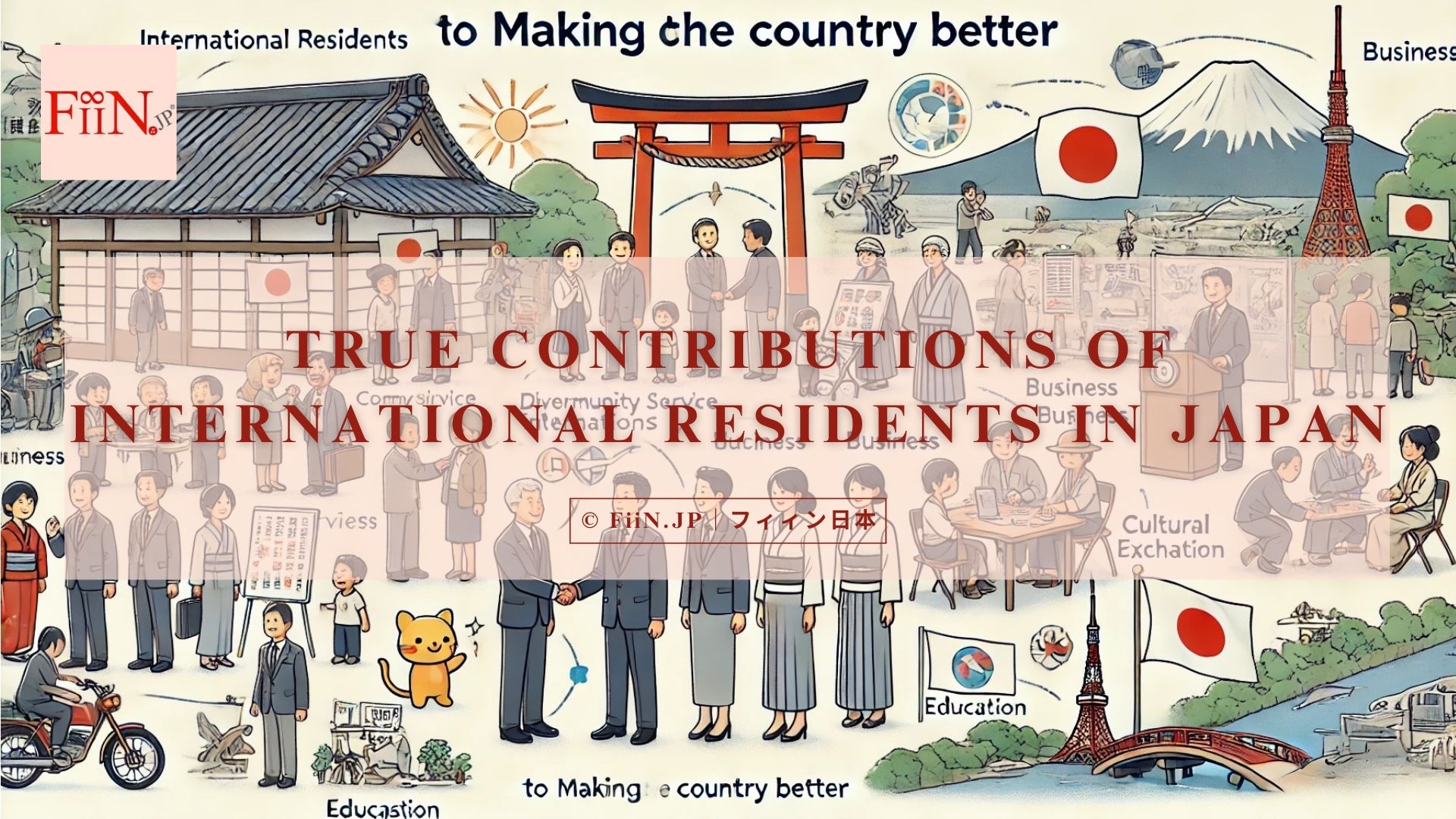True Contributions of International Residents in Japan (with Statistic Evidence)
TOKYO – The statistical evidence underscores the significant impact international residents have made and will continue to make in shaping Japan’s future.

KEY TAKEAWAYS:
- International residents are essential in addressing Japan’s labor shortages, particularly in manufacturing and healthcare sectors, contributing 1.72 million workers as of 2020.
- They enrich cultural diversity, enhance educational environments, and support healthcare through professional roles and voluntary services.
- Foreign entrepreneurs boost Japan’s economy with over 30,000 businesses, and remittances from Japan exceeded $8 billion in 2020.
English|Française|Tiếng Việt|Bahasa Indonesia|Wikang Tagalog|日本語
Actual Contributions of International Residents into Japanese GPD (2000 - 2024)
We’ve compiled data from reliable sources:
- Japan’s GDP data: Historical GDP data for Japan from the World Bank and OECD.
- Contribution of international residents: Estimations based on research studies which suggest that international residents contribute approximately 2% to Japan’s GDP annually.
Drag your mouse over the chart below to see the actual numbers for each year (better viewed on a PC)👇
GPD Contributions of International Residents into Japan (2000~2024) - ©︎ FiiN.JP®︎ フィィン日本
Introduction
Japan, renowned for its rich cultural heritage and technological advancements, faces significant demographic challenges, including an ageing population and declining birth rates. These challenges have underscored the necessity of attracting and integrating international residents to sustain the nation’s economic and social systems. The number of foreign residents in Japan has been steadily increasing, with the Immigration Services Agency reporting a total of approximately 2.93 million foreign residents as of December 2020, up from around 2.17 million in 2012. This growth indicates a rising trend in the foreign population, contributing significantly to various sectors of Japanese society.
Drag your mouse on the chart below to see actual numbers of population each year (better viewed on a PC).👇
Number of International Residents in Japan (2000~2024) - ©︎ FiiN.JP®︎ フィィン日本
Looking ahead, the nationalities of international residents in Japan are expected to shift. The Ministry of Justice predicts an increase in residents from Southeast Asian countries such as Vietnam and the Philippines due to bilateral agreements and economic partnerships. Conversely, there may be a decrease in residents from traditional sending countries like Brazil and Peru as economic conditions improve in these nations, and return migration increases.
Here are 8 significant contributions of the international residents in Japan with statistic evidences across the society of Japan:
Workforce Contributions
1. Addressing Labor Shortages
According to a scientific reports of Pacific Affairs on University of British Columbia Journal, one of the most crucial contributions of international residents is their role in mitigating labor shortages. Japan’s population decline has resulted in a shrinking workforce, particularly in sectors such as construction, manufacturing, and healthcare. According to the Ministry of Health, Labour and Welfare, as of 2020, there were over 1.72 million foreign workers in Japan, accounting for about 2.5% of the total workforce. This number has grown significantly from around 680,000 in 2012.
Foreign workers are particularly vital in industries facing severe labor shortages. For instance, in the manufacturing sector, foreign nationals make up approximately 10% of the workforce. Many Brazilian migrants have taken up jobs in these industries, especially in regions like Hamamatsu, where their presence is essential to sustaining local economies .
2. Skilled Professionals and Innovation
Beyond manual labor, international residents also contribute as skilled professionals in fields such as IT, engineering, and academia. These individuals bring diverse perspectives and expertise, fostering innovation and enhancing Japan’s competitive edge in the global market. The number of highly skilled foreign professionals in Japan has more than doubled over the past decade, reaching over 300,000 people in 2020. Their presence is particularly significant in major cities like Tokyo and Osaka, where foreign talent drives advancements in technology and research.
Economic Contributions
3. Entrepreneurship and Business
International residents also contribute to Japan’s economy through entrepreneurship. Many foreign entrepreneurs establish businesses, creating jobs and stimulating economic growth. As of 2020, there were over 30,000 foreign-owned businesses in Japan, contributing significantly to the economy. These businesses often cater to niche markets, offering unique products and services that diversify Japan’s economic landscape. The entrepreneurial spirit of international residents is particularly visible in urban centres like Tokyo and Osaka.
4. Remittances and Economic Linkages
The economic contributions of international residents extend beyond Japan’s borders. Remittances sent to their home countries support families and contribute to global economic stability. In 2020, foreign residents in Japan sent over $8 billion in remittances, highlighting their significant economic impact. Additionally, international residents often act as bridges between Japan and their home countries, fostering trade and investment linkages that benefit both sides.
Healthcare Contributions
5. Addressing Healthcare Needs
International residents play a vital role in Japan’s healthcare sector. Many foreign healthcare professionals work in hospitals and care facilities, particularly in rural areas facing severe staff shortages. The number of foreign healthcare workers in Japan has been steadily increasing, with over 50,000 foreign nurses and caregivers as of 2020 (International Journal for Equity in Health). Filipino nurses and caregivers, for instance, have become integral to the healthcare system, providing essential services to Japan’s ageing population.
6. Voluntary and NGO Contributions
Non-governmental organisations (NGOs) and voluntary groups led by international residents offer healthcare services to marginalised communities. These organisations provide free medical consultations and support services, ensuring that vulnerable populations, including other foreign residents, receive necessary healthcare. In Aichi Prefecture alone, NGOs have provided free medical check-ups to over 10,000 foreign residents annually. Such initiatives demonstrate the solidarity and community spirit among international residents in Japan.
Social Services and Community Support
7. Supporting Social Integration
International residents contribute to social services and community support through various initiatives. They establish support networks and organizations that help newcomers adapt to life in Japan. These groups offer language classes, legal assistance, and cultural orientation programs, facilitating smoother integration and fostering a sense of belonging. For example, the Tokyo Metropolitan Government collaborates with international resident organisations to provide multilingual disaster preparedness training, benefiting over 5,000 foreign residents annually.
8. Volunteering and Community Engagement
Many international residents actively engage in volunteer work, contributing to local communities. They participate in disaster relief efforts, environmental conservation projects, and community events. This involvement not only supports local initiatives but also strengthens the bond between foreign residents and Japanese citizens, promoting social cohesion. During the 2011 Tohoku earthquake and tsunami, international volunteers were crucial in providing emergency relief and rebuilding efforts, showcasing their commitment to their adopted home.
Conclusion
The contributions of international residents in Japan are multifaceted and indispensable. They address critical labor shortages, enrich the cultural landscape, support the healthcare system, and enhance social services. As Japan continues to navigate demographic challenges, the role of international residents will become increasingly vital. Recognising and supporting their contributions is essential for building a more inclusive and resilient Japan. The statistical evidence underscores the significant impact international residents have made and will continue to make in shaping Japan’s future.
References
- Ministry of Health, Labour and Welfare. (2020). Foreign Workers in Japan.
- Immigration Services Agency of Japan. (2020). Statistics on Foreign Residents.
- Ministry of Education, Culture, Sports, Science and Technology. (2020). International Students in Japan.
- Ishikawa, Y. (Ed.). (2015). International Migrants in Japan: Contributions in an Era of Population Decline. Kyoto University Press.
- International Journal for Equity in Health. (2020). Factors associated with access to health care among foreign residents living in Aichi Prefecture, Japan.
- Pacific Affairs. (2015). Book Review: International Migrants in Japan.
Related Post

Getting Credit Cards in Japan for Foreigners: 2024 Complete Guide & Simple Steps
Credit, debit, and prepaid cards from international brands (VISA, MasterCard, JCB,…) are generally accepted across the country...Read more

